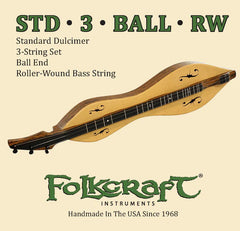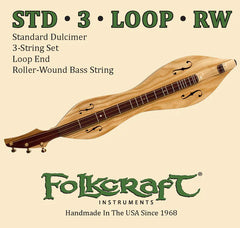How To Choose String Gauges For Your Mountain Dulcimer
November 17, 2023
Good Morning, Y'all!
I'm about to open a can of worms, here, and everyone who has played dulcimer for more than 90 seconds will undoubtedly have their thoughts on the following blog post. But I'm good at trouble-causing questions, so here goes...
I got an email from a customer with the following questions:
Can you explain string gauge a bit? A .011 versus a .012 melody string gauge, .013 versus .014 middle string, and .022 versus .024 low D string? What are the trade-offs on lighter versus heavier gauge strings?
The short and lazy answer? Play what sounds/feels good to you. But that's not particularly helpful, is it?
So, when playing a standard three-string dulcimer (normal octave, DAD or CGC tuning, most likely) Folkcraft uses the following string gauges: .012, .015, .024. The bass string (the .024) is going to be a wound string, and we use a slightly flattened brass wound string, abbreviated RW, so our bass strings are labeled .024RW.
If you want a lighter action, which is easier to play, I might suggest that you try a .011, .014, and .022 string. But you're more likely to get fret buzzes (the lighter strings oscillate more widely, and are also more likely to make fret contact, giving you that metallic buzzing sound). Plus, you'll give up some tone quality, and also lose some volume.
If you want to play more aggressively (with a firm strum, or with a heavier-than-most pick), you might want to try a .013, .016, and .026 string combination. You'll get more volume, and better tone (usually), but the dulcimer will be harder to play.
Like most things in life, string selection is a compromise. Ease of play versus tone quality. Lighter strings are easier to play, heavier strings sound better. A Folkcraft dulcimer ships with the best compromise for most of us. .012, .015, .024RW just "works" for me, and for most of the Folkcraft endorsing artists, and for most of you. Oh, and did I mention that a heavier string is generally a bit louder, too? Yay, another variable to keep in mind.
Bing Futch and Dave Haas both prefer a .016 for the middle string, instead of the Folkcraft-standard .015. Why? Better balance across the strings - the middle string on a .015 is a tiny bit wimpy compared to the outer strings in our standard set. But I feel like the .016 is too difficult to push to the fret, so I've compromised on a consistent feel, knowing that a .016 (with a slightly heavier push-to-fret force) is a little better balanced, volume-wise. Most of us don't play as much as Bing or Dave, and don't have the left hand strength or dexterity to play the .016 without feeling the difference. It is a balancing act, for sure.
Here's a table that'll lay it all out for you:
| Light String | Heavy String |
| Easy to play | Harder to play |
| More prone to fret buzz | Less prone to fret buzz |
| Less volume | More volume |
| Thinner tone | Better sound |
Can you mix and match lighter and heavier strings? Absolutely. You should find the perfect gauge for you and your instrument. We carry nearly all the string gauges in both ball end and in loop end:
Folkcraft stocks 45 varieties of single strings with ball ends
and 41 varieties of single strings with loop ends
On the Folkcraft.com website, try searching for the exact gauge you want, followed by "loop" or "ball," then followed by "single." This will give you a smaller list of better results. For example, ".016 ball single" brings back exactly one search result!
And of course, we have our recommended (start with this, then tweak if you feel the need) strings sets in both ball end and loop end:
 |
 |
And other Folkcraft artists? I'll give you just one example, going towards lighter strings. Carol Walker is a delicate fingerstyle player, and goes with much lighter strings than most people. Her melody string is a .009, and her bass string is a .018, if I recall. I don't have the gentle touch to let me play strings that light without getting a fret buzz.
Now you know as much as I do. Well, maybe not that much, but enough to be comfortable with experimenting. Have a great weekend!
Richard Ash - luthier-who-has-thought-way-too-much-about-dulcimer-setups-and-string-gauges
